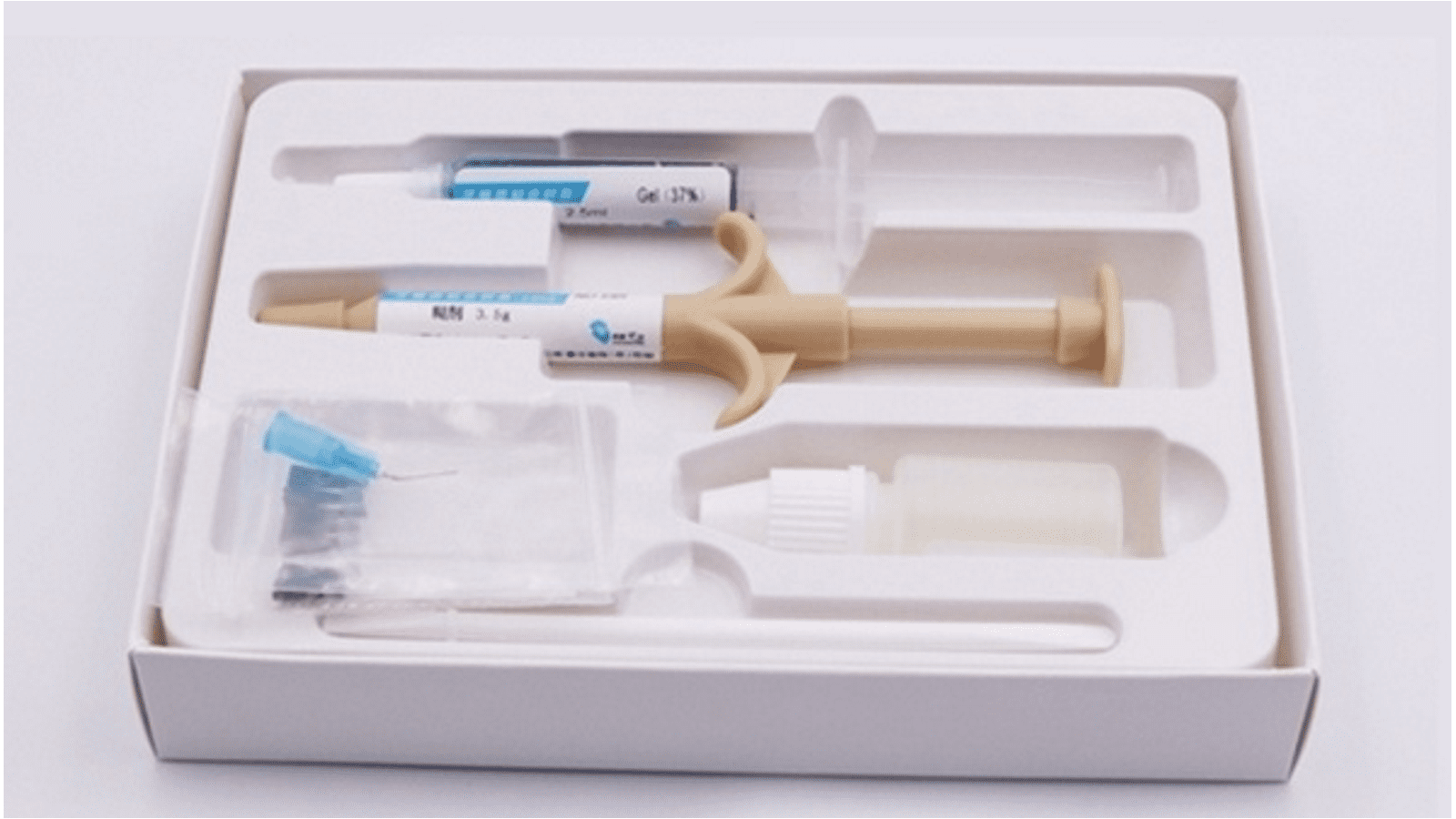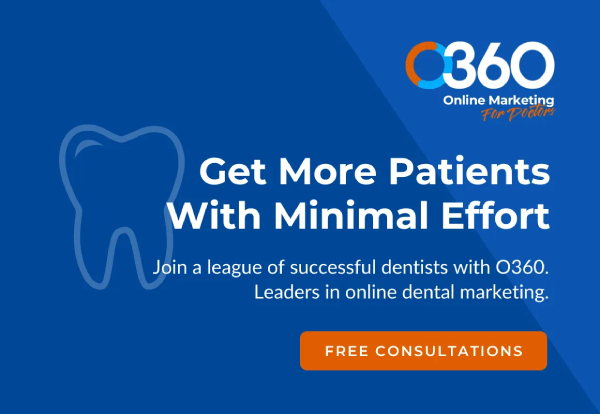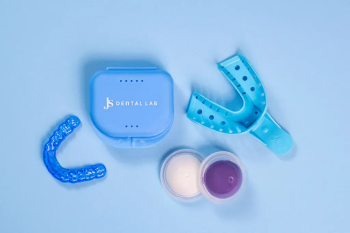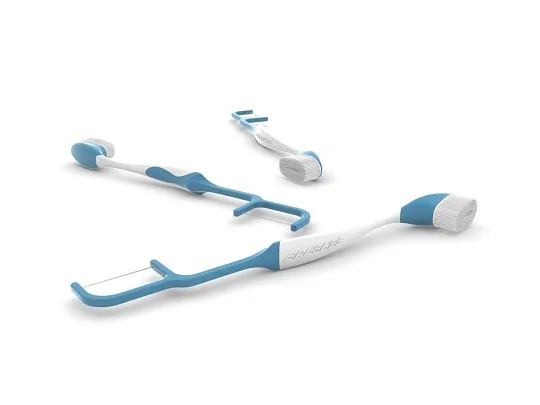How to Search For The Best Adhesive Agent for Dental Restorations
Bonding glue, also known as dental adhesives, plays a critical role in restorative dentistry, allowing dentists to create conservative designs that help to preserve the cavity tissues and create tighter seals between the healthy tissue and restorations. To choose the best adhesives, understanding the advantages and disadvantages of the adhesives you use in your practice can help you choose the right procedures for your patients and provide the best outcomes.
Table 1: Comparison of Prices and Ratings for Dental Adhesives
| Dental Adhesive | Net32 Price | Net32 Ratings |
|---|---|---|
| Scotchbond Universal Adhesive | $96.22 | 5 stars out of 54 Reviews |
| Adper Single Bond 2 | $38.50 | 4 ½ stars out of 85 Reviews |
| OptiBond Solo Plus | $99.00 | 5 stars out of 60 Reviews |
| Clearfil SE Bond | $87.25 | 5 stars out of 67 Reviews |
| iBond Self Etch Dental Adhesive | $181.50 | 5 stars out of 14 Reviews |
Table 2: Comparison of Features of Dental Adhesives
| Dental Adhesive | Type | Uses | Key Ingredients | Additional Features |
|---|---|---|---|---|
| Scotchbond Universal Adhesive | Universal Adhesive | Direct and indirect bonding procedures, bonding veneers, roof surface desensitization, intraoral repair of indirect restorations | Ethanol and water-based solution, MDP, silane | Removes post-operation sensitivity |
| Adper Single Bond 2 | Total-etch adhesive | Direct light cure restorations, indirect restorations after light curing | Ethanol and water base solution, nano-filler technology | Incorporates a silica filler to prevent clustering |
| OptiBond Solo Plus | Total-etch system | Longer-lasting adhesion, excellent for intraoral repairs of composite and porcelain restorations | 0.4-micron filler at 15% | Reinforces penetrations into the dentin, provides protection against microleakage |
| Clearfil SE Bond | Light-cure bonding system with a water-based primer | Intraoral repairs of composite and porcelain restorations | Water-based primer | Combines treatment of enamel and dentine in one step, doesn’t require shaking or rubbing to activate |
| iBond Self Etch Dental Adhesive | All-in-one adhesive | Etching, priming, and bonding in one step | Quality ingredients | Creates a homogenous layer in the dentine and enamel, delivers reliable bond strength |
Dental adhesives can be classified into these broad categories:
Total-Etch – The total-etch technique takes the primary components, etchant, primer, and bonding, and during the ’80s and ’90s, were separated and individually packaged to be applied in sequence. This process formed high bond strength and gave an average of 25 Mpa, but the process made the product line sensitive and time-consuming for dentists, and thus, simpler forms, where the etching step was removed, were formed to compensate.

Self-Etch – Self-etch primers helped eliminate the etching step, and when self-etch was first developed, the adhesive would bond well with the dentin but not with the enamel. Self-etch strengths range from 18-25MPas, and use these adhesives. Using phosphoric acids in moderation is best recommended to allow the bonding material to adhere to the tooth’s enamel.
Selective-Etch – A sub-category of a Universal, the selective-etch technique combines both the primer and adhesive into one bottle. It works to remove the hydrophobic resin and replace it with a hydrophilic resin to increase water absorption. It aimed to reduce the amount of post-operative sensitivity found with earlier generation adhesives such as the self-etch and total-etch and has a strong range of 20-25 Mpa.
Universal – As a popular choice among dentists, the universal adhesive combines the priming, etchant, and bonding materials and combines them into one bottle for ease of time consumption. Universal adhesives, however, tend to hold a lot of water, which makes them prone to chemical breakdowns and hydrolysis. However, they’re more hydrophilic than many two-step self-etching systems and don’t require any mixing. Its bond strength ranges from 18-25 MPas and is known as the simplest system to date.
All of these terms refer to the technique that dentists can use to work with adhesives. However, the outcome of the restoration can also depend on the curing light used, such as:
Self-cure: A class I auto-polymerizing process that can be used for all kinds of indirect restorations but tends to lack color stability.
Light-cure: A class II curing system that used light as an activation mechanism, highly usable for ceramic restorations, thus less impacting the shade and translucency of the restoration.
Dual cure: A class III curing system combining both the auto-polymerizing effects of class 1 and the light-activation mechanisms of class 2. These combined effects of amine and photo-initiators can be used for color-sensitive restorations.
When choosing a dental adhesive, some factors to take into account are:
- Incidence of post-operative sensitivity
- Bond strength
- Ease of use
- Work-ability
- Compatibility with resin cement systems
1. Scotchbond™ Universal Adhesive by 3M ESPEDne

Product Description
Scotchbond™ Universal Adhesive by 3M ESPE is a leading dental adhesive that offers exceptional versatility and clinical performance. Recognized as a Top Product Award Winner in 2018 and awarded Best Bonding Agent of 2019 by DentalTown, it boasts a 98% clinical rating by Dental Advisor. This adhesive is designed to eliminate post-operative sensitivity thanks to its ethanol and water-based formulation, ensuring optimal patient comfort and reliable bond strength.
Product Overview
Scotchbond™ Universal Adhesive contains MDP and silane, making it compatible with metal, silica-based ceramic, and zirconia restorations. Its universal formulation allows it to be used in both direct and indirect bonding procedures. The adhesive is easy to apply: scrub into the tooth surface for 20 seconds, air dry for five seconds, and light-cure for 10 seconds. Additionally, it’s an excellent choice for bonding veneers, root surface desensitization, and intraoral repair of indirect restorations.
Key Features
- Ethanol and water-based solution reduces post-operative sensitivity
- Contains MDP and silane for compatibility with metal, silica-based ceramic, and zirconia
- Suitable for both direct and indirect bonding procedures
- Simple application protocol: 20-second scrub, 5-second air dry, 10-second light cure
- Versatile use in bonding veneers, root surface desensitization, and intraoral repair
Common Applications
- Direct and indirect bonding procedures
- Bonding veneers
- Root surface desensitization
- Intraoral repair of indirect restorations
Technical Specifications
- Brand: Scotchbond™ Universal Adhesive
- Manufacturer Name: 3M ESPE
- Form: Liquid Adhesive
- Net32 Price: $96.22
Awards
- Top Product Award Winner 2018
- 98% Clinical Rating by Dental Advisor
- Best Bonding Agent of 2019 by DentalTown
Customer Ratings
Rated five stars out of 54 reviews on Net32, customers appreciate the adhesive’s reliability, ease of use, and versatility across multiple dental procedures.
Customer Feedback
Feedback consistently highlights the product’s user-friendly application, reduction of post-op sensitivity, and dependable performance across a wide range of dental materials and procedures.
Net32 Price: $96.22

2. Adper Single Bond 2 by 3M ESPE

Product Description
Adper™ Single Bond 2 by 3M ESPE is a light-activated, total-etch dental adhesive designed to deliver maximum control and reliable performance in bonding procedures. Utilizing an ethanol and water-based solution combined with nano-filler technology, this adhesive ensures exceptional stability and ease of application for both direct and indirect light-cure restorations.
Product Overview
The adhesive incorporates silica fillers, enhancing its mechanical properties and providing superior bonding strength. The presence of five-nanometer particles prevents the adhesive from clustering, promoting uniform dispersion and consistent results. Adper™ Single Bond 2 offers clinicians a dependable and efficient solution for a wide range of dental bonding applications.
Key Features
- Total-etch adhesive with ethanol and water base for consistent performance
- Nano-filler technology ensures smooth application and dispersion
- Five-nanometer particles prevent clustering, improving stability
- Light-activated for direct and indirect light-cure restorations
- Incorporates silica fillers for added strength
Common Applications
- Direct light-cure restorations
- Indirect light-cure restorations
- General dental bonding procedures
Technical Specifications
- Brand: Adper™ Single Bond 2
- Manufacturer Name: 3M ESPE
- Form: Light-activated dental adhesive
- Net32 Price: $38.50
Customer Ratings
With a rating of 4 ½ stars out of 85 reviews on Net32, users appreciate the adhesive’s ease of use, stability, and reliable bonding performance.
Customer Feedback
Feedback highlights the adhesive’s smooth handling, stable dispersion, and consistent results, making it a trusted choice among dental professionals.
3. OptiBond Solo Plus by Kerr Dental
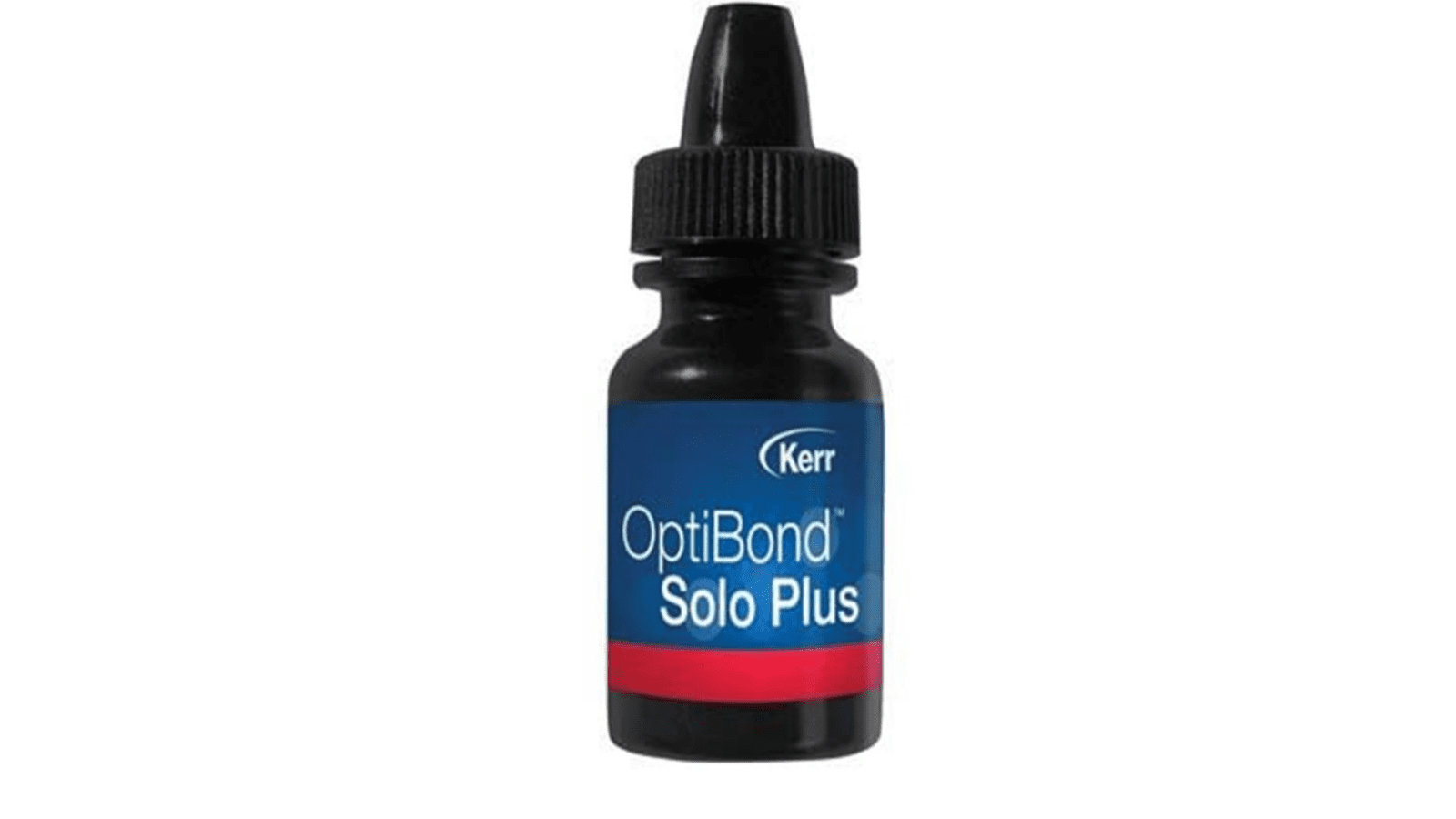
Product Description
OptiBond Solo Plus by Kerr Dental is a high-performance total-etch adhesive system designed to deliver exceptional bonding strength and protection against microleakage. Recognized as one of the Best Bonding Agents of 2017 by DentalTown (Townie Choice Awards), it has earned a reputation for quality and reliability in restorative dentistry.
Product Overview
Formulated with a 0.4-micron filler at 15%, OptiBond Solo Plus reinforces penetration into dentin, forming a competitive structural bond that rivals nanofiller systems. This enhanced formulation effectively reduces polymerization shrinkage, ensuring long-term integrity and durability of restorations. It is the ideal solution for dental professionals seeking reliable adhesion and protection against restoration failures.
Key Features
- Total-etch system with 0.4-micron filler (15%) for optimal penetration and bonding
- Provides protection against microleakage
- Reduces polymerization shrinkage for lasting restoration integrity
- Competitive performance compared to nanofiller bonding systems
- Award-winning formulation recognized by DentalTown
Common Applications
- Direct restorative procedures
- Dentin and enamel bonding
- Composite restorations
Technical Specifications
- Brand: OptiBond Solo Plus
- Manufacturer Name: Kerr Dental
- Form: Total-etch dental adhesive
- Net32 Price: $99.00
Awards
- Best Bonding Agents of 2017 by DentalTown (Townie Choice Awards)
Customer Ratings
Rated five stars out of 60 reviews on Net32, users appreciate the adhesive’s reliable performance, ease of use, and protection against microleakage.
Customer Feedback
Feedback highlights the product’s strong adhesion, consistent handling, and proven performance in reducing polymerization shrinkage, making it a preferred choice among dental professionals.
4. Clearfil SE Bond by Kuraray America

Product Description
Clearfil™ SE Bond is a renowned two-step, self-etch, light-cure adhesive system designed to provide exceptional bond strength and sealing properties. Developed by Kuraray, pioneers in self-etching technology, this system simplifies the bonding procedure while ensuring reliable and durable adhesion for various dental restorations.
Product Overview
This adhesive system comprises a water-based primer and a bonding agent, eliminating the need for separate acid etching and rinsing steps. The unique “Outer Case” delivery system allows for direct finger control, enhancing ease of use and minimizing waste. Clearfil™ SE Bond is compatible with all light-cured restorations and is indicated for a wide range of applications, including direct fillings, cavity sealing for indirect restorations, treatment of hypersensitive teeth, and intraoral repairs of fractured restorations.
Key Features
- Simplified Application: Two-step self-etching process reduces technique sensitivity.
- Enhanced Bond Strength: Provides strong adhesion to dentin, enamel, metals, and porcelain.
- Effective Sealing: Offers excellent marginal sealing to protect against microleakage.
- Versatile Use: Suitable for composites, compomers, and various restorative procedures.
- User-Friendly Design: Outer Case system allows for controlled dispensing.
Common Applications
- Direct composite restorations
- Cavity sealing prior to indirect restorations
- Treatment of hypersensitive or exposed root surfaces
- Intraoral repairs of porcelain, hybrid ceramics, or composite restorations
Technical Specifications
- Brand: Clearfil™ SE Bond
- Manufacturer: Kuraray America
- Components:
- Primer: 6 ml
- Bond: 5 ml
- Curing Method: Light-cure
- Packaging Options:
- Standard Kit (Primer 6 ml, Bond 5 ml, accessories)
- Value Kit (3 Primers 6 ml, 3 Bonds 5 ml, accessories)
- Net32 Price: $117.84 for 5 ml Bond Only
Customer Ratings
Clearfil™ SE Bond is widely regarded by dental professionals for its reliable performance and ease of use. Its long-standing reputation as a gold standard in adhesive systems is supported by consistent positive feedback.
Customer Feedback
Users commend Clearfil™ SE Bond for its:
- Consistent and strong bonding results
- Simplified application process
- Versatility across various restorative procedures
- Effective sealing capabilities reducing postoperative sensitivity
Net32 Price: $87.25

5. iBond Self Etch Dental Adhesive by Kulzer

Product Description
iBond Self Etch Dental Adhesive by Kulzer is a reliable all-in-one adhesive system that combines etching, priming, and bonding in a single step. Its advanced formulation ensures consistent and effective adhesion to both enamel and dentine, delivering dependable results in restorative dentistry.
Product Overview
The adhesive creates a homogenous layer on dentine and enamel surfaces, resulting in reliable bond strength and a glossy surface that indicates a proper seal. This visible seal gives clinicians confidence in their bonding procedures. When compared to other single-step adhesives like Clearfil S3, Adper Prompt, and Hybrid Bond, iBond Self Etch demonstrates competitive shear bond strength averages of 20-25 MPa on dentine and a combined bond strength of 24.0 MPa for both enamel and dentine.
Key Features
- All-in-one adhesive combines etching, priming, and bonding
- Creates a homogenous layer for reliable bonding strength
- Glossy surface provides a visual indicator of proper sealing
- Average shear bond strength of 20-25 MPa for dentine
- Combined bond strength of 24.0 MPa for enamel and dentine
- Consistent, high-quality results compared to competitors
Common Applications
- Direct composite restorations
- Bonding of dental materials to enamel and dentine
- General dental bonding procedures
Technical Specifications
- Brand: iBond
- Manufacturer Name: Kulzer
- Form: Self-etch dental adhesive
- Net32 Price: $180
Customer Ratings
Rated five stars out of 14 reviews on Net32, users appreciate the adhesive’s reliability, ease of use, and consistent bonding results.
Customer Feedback
Feedback highlights the adhesive’s high-quality formulation, efficient one-step application, and reliable bond strength, making it a preferred choice among dental professionals.
